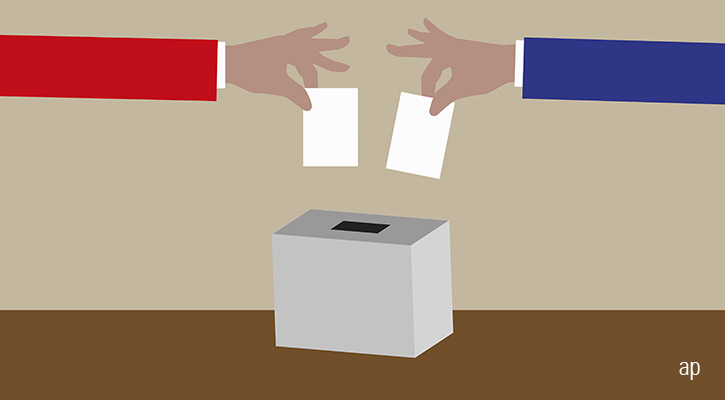Linda Abu Mushrefova: Hi, I'm Linda Abu Mushrefova for Morningstar, and this is Wednesday morning, Nov. 4, 2020. With me is Morningstar's Aron Szapiro, head of policy research, Preston Caldwell, head of U.S. economics research, and Dave Sekera, chief U.S. market strategist. Thank you all for joining me.
Heading into this election, the big issues investors were considering are taxes, stimulus, regulation, and the likely market reaction as we get results. Aron, would you please provide us with a synopsis of the outcome of the presidential race and status of congressional elections?
Aron Szapiro: Right now, where we are is we don't totally know, as will probably surprise none of our viewers here. So we're waiting on these counts from these Midwestern Rust belt states, and I have to say, this is not that surprising. This was probably the predicted modal outcome going in. Now, where we do have a bit more clarity is Democrats had hoped to capture a few reach Senate seats. They came up short on all of those, so even if they were to secure a majority, it's certainly not going to be a big one. It looks increasingly less likely that they would be able to secure even a narrow majority.
Mushrefova: And what do you expect from here regarding the elections that have not yet been determined?
Szapiro: It's really a tricky thing because we're used to the vote tallies changing as the course of the night goes along. But here, what we have is a lot of outstanding votes that we don't know if it's absentee or not in some cases. And we know that there's a really, really, really big partisan split on those absentee votes. We're used to absentee votes either not mattering that much--because there aren't that many of them, particularly in the states that this year have a lot of absentee votes--or we're used to those not having quite as big of a partisan split.
It does seem like there are paths for either Biden or President Trump to win, and we'll have to just wait for everything to be counted. But if you had to ask me to guess right now, I think Biden is in the stronger position.
Mushrefova: Based on the current election status, then, what are your expectations for changes to policy and regulations?
Szapiro: This I think we have a little bit more clarity with one big "if." We came out with some analysis last week, and we really emphasized that the size of any potential Senate majority for Democrats would make a big difference. It's really awfully hard to govern if you have a very small majority, even in a situation where there's unified government. So since the code of uncertainty has closed around, maybe, maybe, maybe depending on a special election in Georgia and maybe a few other surprises, a narrow democratic majority or Republican majority. We think it's going to be fairly difficult to do really big policy changes of the types that have been talked about over the last 18 months during the campaign.
I think the thing that we really all want to keep an eye on is the fate of stimulus and the lame duck, what the majority of the majority of senators want to do there. Again, we'll get more clarity as we have final election results for both the Senate races and the presidential race.
Mushrefova: Preston, turning to you, how does the election outcome impact your economic outlook?
Caldwell: Our view has been that, largely irrespective of the election outcome, our outlook on the U.S. economy would remain optimistic. Now, the one scenario we have been concerned about from a macro standpoint which is a serious possibility right now is a Biden win combined with the Republican hold on the Senate. We thought that if either Trump won or if Biden won along with a Democratic Senate, the chances of another massive stimulus in 2021 were quite good. By contrast, the prospects for stimulus in a Biden win/GOP Senate outcome look poor. Recent historical experience suggests that a democratic president paired with a GOP Congress is likely to result in gridlock as well as stringency on the deficit.
With that said, we don't think the lack of further stimulus is a fatal threat to the recovery, because if we do get more stimulus, that will primarily pull forward the recovery without altering the long run-trajectory of the economy. In our base case, we expect that much of the slack in the economy to be gone in the next few years. And at that point, stimulus doesn't have much meaningful benefits to the economy.
Much more important than stimulus is whether we get a vaccine, and we remain optimistic that we will get a successful vaccine and that broad vaccination will occur in the first half of 2021. Right now much of the U.S. economy is actually in good shape with the exception of some industries like restaurants, hospitality, and air travel, which are still being hard-hit by the need to social distance. Broad vaccination will clear the way for a complete economic recovery, including these hard-hit industries. We shouldn't also forget the beneficial impact of the stimulus already passed in 2020, which is still having an ongoing effect on the economy. This was the largest peacetime fiscal stimulus in U.S. history. Much of that stimulus spending went into the pockets of ordinary households and much of this income windfall was saved, which has bolstered household balance sheets. As such, this has positioned households well to spend more, once the vaccine lifts remaining restrictions on normal economic activity.
Mushrefova: Dave, what is your outlook for the U.S. stock market?
Dave Sekera: In the short term, we're certainly going to see some volatility over the next few days and certainly saw a pretty good amount of volatility and swings back and forth in the market overnight. However, I think a lot of that is just going to be noise and essentially just traders coming in, just trying to gain the headlines for now. For long-term investors, I would certainly caution against making any significant changes to your portfolio based on these short-term moves. As Preston mentioned in the medium term, irrespective of the outcome of the election, we think it's really the progression of the pandemic and the timing for the approval and the rollout of the effective vaccine. That was really the larger determinant of the stock market performance over the next couple of quarters.
Over the long term, the returns in the stock market will be determined by the strength and the length of the ongoing economic recovery. In fact, looking at the broad market overall, we think the U.S. market is pretty close to fair valued, and that's using a composite of the fair value estimates as determined by our equity research team with a bottom-up fundamental focus. However, I would note that the valuation of the broad market is skewed upwards by several mega-cap stocks that we think are significantly overvalued. If you were to adjust by removing those overvalued stocks from our borrowed market valuation, we probably think the rest of the market is a little bit undervalued at this point.
The primary risks of the broad equity markets at this point, though, is if during the outcome of the election we do see a scenario in which Biden does oust Trump, and they have a strong enough hold on Congress to implement his corporate tax rate hikes. So depending on the final outcome of that tax rate hike, we could see a decrease in earnings somewhere in the upper single digits for companies, which would certainly be a headwind for the equity markets in the near term.
Now, having said that, we do think that at least some of those tax rate hikes are already priced into the markets. We saw the markets peak in early September, which is also the same point in time that the polls were closest. The polls have been widening out, showing a Biden lead over the past couple of weeks, and we did see some pullback in stocks. So we think some of that pullback is going to be due to the probability weighting of a corporate tax rate hike. And some of the pullback is also due to the increase in the number of COVID cases that we've seen over the past couple of weeks. So between those two, we do think that the markets are pricing in that corporate tax rate hike. So again, we'll see where the election turns out over the next couple of days and whether or not those corporate tax rates are going to go through.
Mushrefova: You mentioned that you viewed the mega-caps as being more richly valued. And considering that you see the broad market as fairly valued, where do you see value for investors today?
Dave Sekera: We see probably the most opportunities in the small-cap and the mid-cap space, especially in the value category. Among the different sectors that we follow, we think the energy sector is still very cheap. And in fact, other than when the market bottomed out in March earlier this year, the energy is pretty much as cheap as we've seen ever since we started covering stocks in early 2002. The financial services sector is probably the next cheapest sector. And as you mentioned, in that mega-cap space, the technology space is overvalued. With the market pullback, it's become less overvalued, but that would be one area that if individuals are looking at buying stocks on specific companies, I'd recommend taking a look at that, take a look at our fair value estimates first, and just make sure that those are stocks that you think are appropriate for your risk base.
Mushrefova: Aron, circling back to you, what are your thoughts on what this means for investors?
Szapiro: Again, depending on when we get a final outcome for the presidential election, I think there are a few key issues that will affect investors themselves. One is on the extent to which the regulations around ESG and retirement plans, which were unveiled and finalized on Friday and will be in effect before Jan. 20, are rolled back. We'd expect a Biden administration to take a real look at those. And the other is on this fiduciary rule that the department of labor has proposed to replace the 2016 rule align better with regulation best interest. And that's something that we expect to see a final version pretty soon. And obviously, if Trump prevails, that will stick for the next four years, but it's also something that we would expect a Biden administration to take another look at, although it would go into effect and be applicable at least for a little while.
Mushrefova: Aron, Preston, Dave, thank you for the insightful discussion and thank you everybody for tuning in. Continue to visit morningstar.com for updates and have a wonderful day.
How Exposed Is Your Equity?
Get The Global Makeup Of Equity Indexes With Our Free Tool Here








.jpg)











